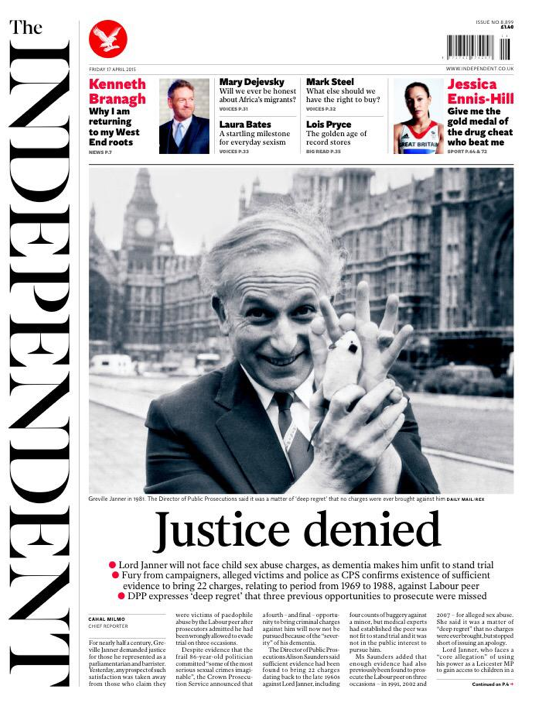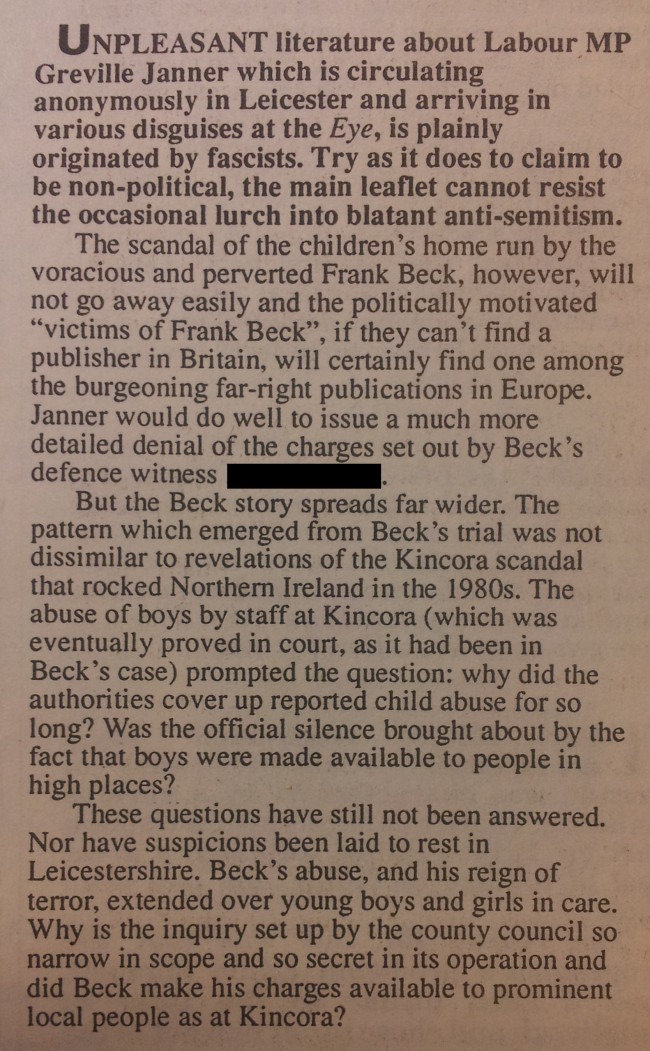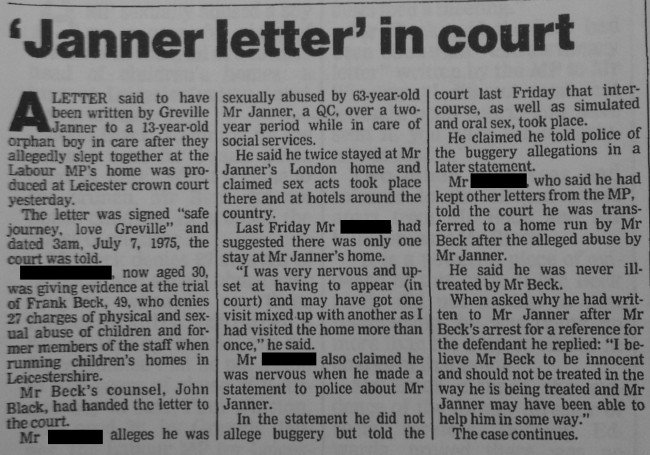The Hunting of Lord Janner: Frank Beck, The Commons Address And Nazis
Westminster paedophiles: a regular look at reporting on allegations of VIP child abuse in the mainstream media.
The story of Labour peer Lord Greville Janner of Braunstone, QC, features prominerly on the cover of the Times and Independent. Police have investigated complaints made by 20 alleged victims who claim Janner sexually abused them in care homes for boys. The Times leads with news that senior lawyers wanted Janner charged with 16 offences against nine alleges victims. The claims date back to the 1960s. He won’t be in court because Alison Saunders, the Director of Public Prosecutions, announced that prosecuting the peer was not in the public interest because Janner’s dementia means he would unable to follow proceedings.
No trial. But still Janner is the subject of a Indy’s frontpage that is a little suggestive. The puppies can wait – do you want to see my mouse?

The Indy says that Justice has been denied the victims. The alleged victims have been badly treated.
The Indy then labels Janner a hypocrite:
Greville Janner has criticised the Old Bailey jury system for allowing an 86-year-old man to escape being questioned in 1997 over Nazi atrocities that had taken place in 1941 and 1942.
Szymon Serafinowicz, a retired carpenter from Surrey, was arrested in 1995 as the first British person under the War Crimes Act in connection with murders of three Jewish people during the Second World War.
He had denied the allegations but could not answer questions and put forth his case during a trial due to having dementia.
Mr Serafinowicz was a former police chief in Nazi-occupied Belarus during World War II. The 86-year-old was suffering from Alzheimer’s disease. After the judge’s ruling, he died seven months later.
The JC reported in 2012:
When Sobibor guard John Demjanjuk was found guilty of war crimes at the age of 91, Lord Janner expressed the view that “no concessions to age or the time that has passed can be made when it comes to justice for crimes of this magnitude”…
In July, Ladislaus Csizsik-Csatáry was charged in Hungary over alleged involvement in the deportation of 15,700 Jews to Auschwitz. He is 97. “I don’t care what bloody age they are,” says Lord Janner. “These criminals should have been dealt with years ago.”
True enough. But ‘justice denied’ can also be justice denied for the accused.
In 2007, comedian Peter Serafinowicz spoke out:
“These horrific allegations were made in a book written by a former friend of my grandfather’s. My grandfather completely refuted the allegations. Unfortunately, due to a degenerative illness, he was denied the opportunity to demonstrate that there was no truth in the allegations by presenting his case.”
Lord Janner is 86-years-old. He has been suspended by the Labour Party. The Indy lists his would-have-been charge sheet:
He would have been charged with 14 indecent assaults on a male under 16 between 1969 and 1988; two indecent assaults between 1984 and 1988; four counts of buggery of a male under 16 between 1972 and 1987; and two counts of buggery between 1977 and 1988.
Are we to assume guilt?

Private Eye, 14th February 1992
The alleged facts are being aired.
In the Mirror, Michael Allan, who has accused the peer of sexually assaulting him as a child, says he feels “violated all over again” that the case is being dropped. His claims should be tested in court as they are being broadcast in the media. The media offers neither closure nor justice. It offers only noise and exposure.
The Guardian writes:
Janner, who is 86 and widowed with three children, has strenuously denied the allegations. He did so in the 1990s in the House of Commons after he had been identified during the trial of Frank Beck, a care home warden suspected of abusing around 200 children between 1973 and 1986.
The new police investigation has gone where the first in 1991 was not allowed to. In 1991, according to Mick Creedon, now chief constable of Derbyshire, who was then a detective sergeant on the Beck case in Leicestershire, senior officers ordered him neither to arrest Janner nor search his London flat.
This time Janner’s London home and office in the House of Lords was searched after police obtained warrants from a court. But Janner was never interviewed because of his ill health – which angered officers working on Operation Enamel.
Detectives are even more angry with the decision from Saunders not to prosecute and have said their investigation will continue.

The Guardian, 12th November 1991
The Telegraph says “Keith Vaz, currently the Labour candidate for Leicester East, said in 1991 that his friend had been ‘the victim of a cowardly and wicked attack by people who simply did not care what damage they did to him’…. Today Ms Saunders admitted there had been sufficient evidence to charge Janner in 1991, and that it had been a ‘mistake’ not to put him on trial.”
Janner should have been tried without sufficent evidence to secure a prosecution? Is the justice system simply about the police and CPS looking righteous and not part of the problem? Is reporting on allegedly heinous crimes about scoring party political points?
Note: you can read Vaz’s words in the the context of Janner’s address to the Commons in 1991 debate on Contempt of Court here.
Anyone involved in a trial can make any allegations they wish about anyone else—provided that the judge cannot disallow them as irrelevant—however harmful, horrendous and vile the lies may be. Those whose representations are attacked are forbidden even to deny the allegations. To do so would be a criminal offence—contempt of court.
As the House knows, Frank Beck of Leicester was convicted of a series of filthy and most serious crimes and received what must be a near record sentence—five life terms and a total of 24 years’ imprisonment. He called ***** ****** as a witness. Long ago, when ******* was a deprived youngster living in a Leicestershire children’s home, my family and I tried, unsuccessfully, to help him. Soon after, he was placed in a home run by Beck. After 15 years of Beck’s influence—including a period when ****** lodged in Beck’s private home—and after I had refused to provide Beck with references and shortly before Beck’s trial was due to begin, they combined to make disgraceful, contemptible and totally untrue allegations of criminal conduct against me.
Their motive was made blazingly clear by a letter that I received only yesterday from a former cellmate of Beck’s. I do not know the man, but he took it on himself to communicate with me. He writes that Beck told him that he—Beck —was going to frame me. According to Beck, that would take the light off him. To that end, Beck had enlisted the help of ******. The former cellmate also wrote that the police knew that he was willing to give evidence to that effect if the Crown thought it necessary to call him. In the event, it did not, but the allegations against me were precisely as the prosecution alleged in Beck’s trial —an attempted diversion from the reality of Beck’s guilt. Both verdict and sentence showed—happily—that the attempt failed totally.
226 However, is it not horrendous that Beck and ****** were able to make such terrible and lying accusations against me in court and that the media could, and with honourable exceptions did, report these falsehoods, all under the cloak of absolute privilege? I had effectively no legal rights in the matter, and I was not allowed even to nail the lies. No wonder many people were mystified by my uncharacteristic silence —it was imposed by the cruel operation of the rules on contempt.
Happily, I am a fairly tough character. I have been able to ride out the agony on this ordeal in good heart. But it has not been easy. As a Member of Parliament, I am now well placed to fight back. That would not have applied to any of our constituents or to any other citizens placed by law in this impossible and unjust situation.
The injustice was both apparent and real. It imposed a special burden on my wife, on my children, on my mother and my sister and on all my family. I pay my loving tribute to them for their staunch and cheerful support during our shared ordeal. I also thank the many hundreds of people who have so kindly written, spoken to or telephoned us to express their affectionate encouragement. Several of them were themselves victims of Frank Beck. I salute their courage and send them my profound sympathy. We ourselves have received nothing but kindness, confidence and concern. We are very grateful. We are deeply blessed with our friends, not least those on both sides of the House and our friends in Leicester, West.
Surely there should now be a swift review of these injustices in our law and its practice. Surely it must be wrong for people who have no part in a trial to be open to venomous, preposterous attacks, with no remedy, no recompense and, above all, no right of reply. Surely others should not be forced to suffer as we have done. If such a review does lead to a just and useful alteration in the operation of the law of contempt, we shall not have suffered in vain.
Posted: 17th, April 2015 | In: Reviews Comment | TrackBack | Permalink


